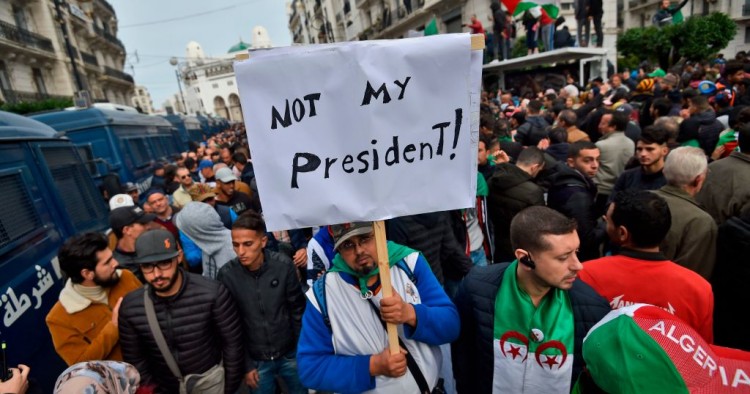Starting in February Algeria saw huge protest marches across the country demanding the removal of the existing governing system and the installation of a transition government in its place. The scale of the marches made impossible a credible presidential election scheduled for April. Ailing President Abdelaziz Bouteflika, in office 20 years and planning to run yet again, resigned in April under pressure from the Army. The protesters’ elation was short-lived, however. The Army rejected the protest movement’s demand that the interim president and prime minister also quit. Army chief Gen. Ahmed Gaid Salah, in a public role unprecedented in modern Algerian history, insisted that the government hold a new presidential election by year’s end. The protest movement doubted the government would hold a fair vote, and marches continued with bitter criticism of the government and Gaid Salah by name. Algerian security forces gradually took a tougher line. Amnesty International stated in December that 300 protesters were in detention; some Algerian monitors said the number was higher.
To mollify the angry street, the Army launched an anti-corruption campaign. Immediately before the December presidential election, an Algiers court handed down long prison sentences to two former prime ministers, and the former chief of military intelligence, who had practically co-ruled Algeria for decades, was in jail awaiting trial along with other former ministers, politicians, and well-connected businessmen. The protest movement ignored the anti-corruption campaign while sustaining its demand for a deep overhaul of the entire governing system before any election be held.
The Dec. 12 election of 74-year-old former Prime Minister Abdelmadjid Tebboune to the presidency further inflamed the protest movement. Tebboune, a member of the central committee of the former ruling National Liberation Front, is no break with the ruling system. The next day saw enormous nationwide protests rejecting the election — the 43rd consecutive Friday of peaceful protests. Tebboune and the Army leadership finish the year with doubtful legitimacy and remain at an impasse with a protest movement that has not yet developed visible, coherent leadership. Meanwhile, the economic situation has become more dire with stagnant growth and a soaring trade deficit that sharply reduced foreign exchange reserves.
Robert Ford is a Senior Fellow at MEI.
Photo by RYAD KRAMDI/AFP via Getty Images
The Middle East Institute (MEI) is an independent, non-partisan, non-for-profit, educational organization. It does not engage in advocacy and its scholars’ opinions are their own. MEI welcomes financial donations, but retains sole editorial control over its work and its publications reflect only the authors’ views. For a listing of MEI donors, please click here.













